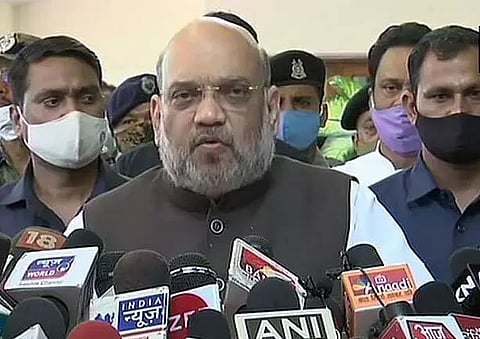
- Home
- Live Blog
- Breaking News
- Top Headlines
- Cities
- NE News
- Sentinel Media
- Sports
- Education
- Jobs

NEW DELHI: Unlike other issues, the BJP-led Central government in New Delhi and the Congress-headed State government in Chhattisgarh, are unanimous over their offensive against Maoists in the "red corridor" of India.
Union Home Minister Amit Shah on Monday said that the Centre will intensify counter-insurgency operations against Maoists following the massive loss of CRPF troopers in a gun-battle on Saturday. Though the BJP and the Congress remain national political rivals, the state's Bhupesh Baghel government has reinforced the same view as that of Shah.
Eighteen CRPF troopers had been missing after five security personnel were killed and 30 others injured on Saturday in a fierce gun-battle with Maoists in a forest near the border between Bijapur and Sukma districts in Chhattisgarh. On Sunday, bodies of 17 of the 18 troopers were recovered from the site, taking the toll up to 22.
Shah, who visited the State for the first time since he assumed charge as Home Minister in the Narendra Modi government, in a review meeting with the Baghel government, said: "I want to assure the country that this fight will not be stopped, rather it will continue with more intensity till the end. In this fight, our victory is definite in the end."
In the same vein, Chief Minister Baghel said the government was determined to set up security forces' strategic camps deeper into Maoist pockets.
However, there are some who feel otherwise. Take for example, former Director General of Police of UP, and Assam and Director General, BSF, Prakash Singh, whose book "The Naxalite Movement in India" covers the subject comprehensively.
Singh told IANS that both the government and the Maoists need to understand that the last 50 years of violence have not yielded anything. "Both sides can fight this war for another 100 years but it will only result in the loss of lives. It is not a simple law-and-order problem. Tribals have grievances - real or perceived - which need to be addressed. Some of their misgivings can be dispelled," Singh said.
The Maoist movement, many analysts believe, are an outcome of governmental apathy towards tribals, absence of land reforms, abject poverty, prolonged deprivation, unemployment, and overall, lack of good governance.
However, Singh said that he is convinced that despite the latest deadly attack against the CRPF, there are still small openings for talks and negotiations. "But for that, both sides have to be sincere about dialogue," he said.
The counter-insurgency expert pointed out that in Chhattisgarh, the government has not made any concerted and persistent efforts at peace talks despite several initiatives taken by civil society members. "In Nagaland, the government held talks for 24 years. We can't expect magical results in a few months of talks with Maoists. Conflict resolution is a painful process which requires patience and determination. Unfortunately, neither the Centre nor the State government seems to have the political will for that right now. There is either overconfidence or they are being misguided by the bureaucracy."
In the last few years, journalist-turned-activist Shubhranshu Choudhary has been running a campaign for peace and dialogue. Tribals have responded positively to his various initiatives. An 11-day peace march was recently organised from Abujmarh in Narayanpur district. Around 150 tribals from Chhattisgarh, Odisha and Telangana walked 222 km and concluded the march in Raipur on March 22. (IANS)